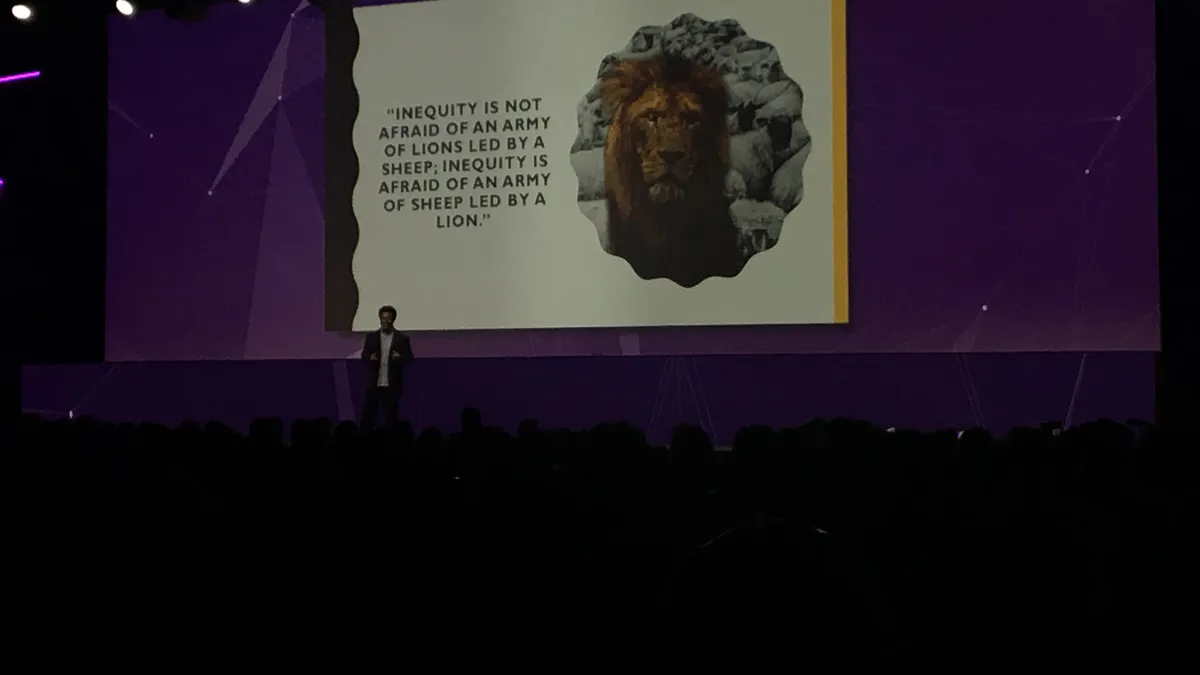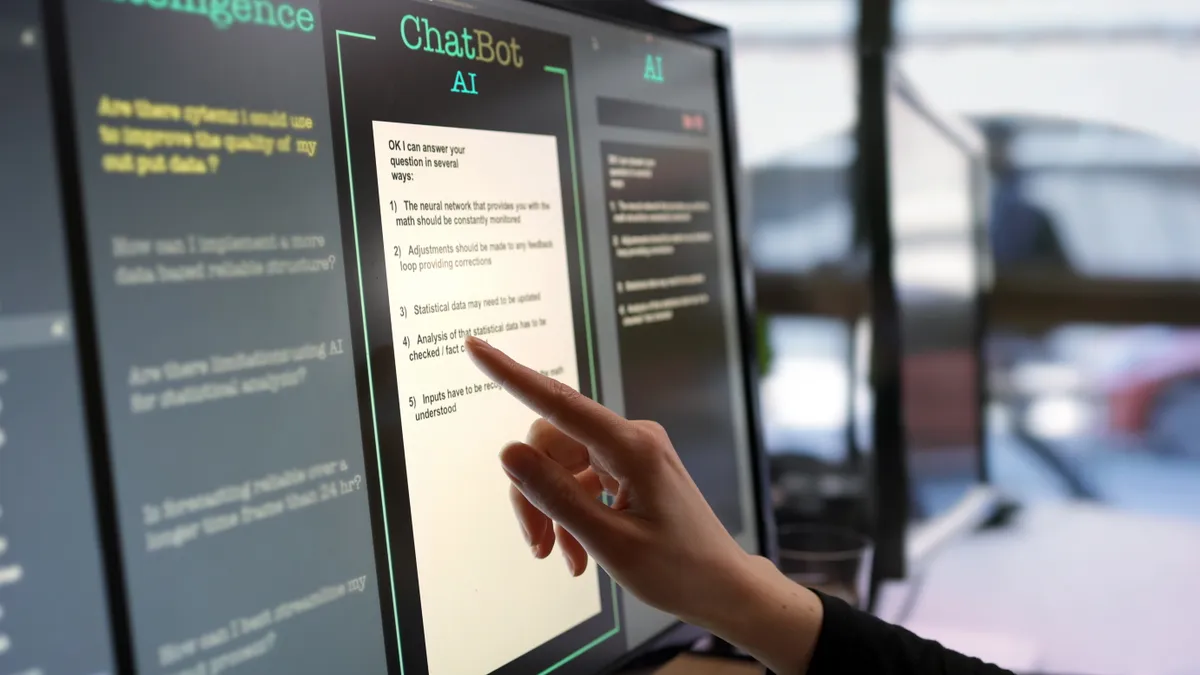PHILADELPHIA — Since the International Society for Technology in Education (ISTE) launched its Certification for Educators program last year, 1,670 educators “from Houston to Hong Kong” have participated, ISTE CEO Richard Culatta noted Tuesday morning during the second day of the organization's annual conference, held this year at the Pennsylvania Convention Center in Philadelphia.
The organization's ongoing partnership with TED is also “helping more educators tell their story by creating their own TED Talk,” Culatta said, noting that this is an important part of inspiring future generations of educators.
And over the next few years, the 5G network will essentially provide speeds akin to having a fiber connection straight to our phones, he said. But these networks aren’t being built for us, they're being built for smart devices. Artificial intelligence (AI) is going to shift the professional and economic futures of today's students, he said. By 2022, AI will eliminate 75 million jobs and create 133 million jobs, according to World Economic Forum. Computing power is also significantly higher than we’re able to take advantage of through current user interfaces, he said.
To help teachers learn how to talk to students about AI, ISTE partnered with GM to create an ISTE U course on the topic. “The language of future problem-solving will be the language of AI,” Culatta said. Students won't just have to work with AI in their future careers, but will have to consider things like the ethics of building things with AI, how to program it to make moral decisions, and what it means to be human.
#ISTE19 Day 3! Richard Culatta @rec54 on the Mainstage with a great talk on the pressing need to introduce Artificial Intelligence exposure/instruction in education. Only 30% of people THINK they use an AI client regularly. the number is closer to 80% " pic.twitter.com/LTH1v2DI6J
— John JWOK Walker (@JWOKedtech) June 25, 2019
This brought him to his final point: Far too often, digital citizenship is taught in a way that focuses on what not to do online. It should focus more on what to do. To promote a range of digital citizenship competencies, ISTE is launching a #DigCitCommit campaign to highlight schools taking this sort of approach to learning.
Following Culatta was ISTE and TED Masterclass speaker Alicia Duell, the director of technology and information services at Wheeling CCSD21, a K-8 school district in suburban Chicago. She detailed how she finally earned her dream job as a central office administrator and thought she was doing great, but was blindsided by her manager when he fired her.
Furthermore, she was told she was better suited for middle management, where her manager said she would learn more about how things are done.
After she was fired, she craved other stories of failure. An old friend and retired superintendent shared the most important of these stories, detailing how he’d been fired from an earlier superintendent job and had questioned his skills and abilities and everything he thought he knew about himself. Fast forward a few decades later and he had retired to great accolades.
Sharing about failure and not seeing it as weakness is critical, she said, adding that reframing failure as an opportunity to learn benefits the person experiecing failure as well as others who can learn from them.
Alicia Duell - sincere conversations of failure are important for ourselves and for our students - who have likely not developed the tools to deal with favor. "Speaking about failure feels shameful, but what if it were reframed ... what power might lie in that?" #ISTE19 pic.twitter.com/rqv3qSM5Yy
— Christopher Bartlett (@C12345678910B) June 25, 2019
"We should be modeling these qualities for our students and staff, and showing them through our own example that it’s OK to fail,” Duell said.
Administrators can design social-emotional learning lessons on failure or design staff meetings centered on sharing failure and embracing it as a learning opportunity, she said. Though she's in a new job she loves, she knows she's always vulnerable to failure and that she’ll fail again — but now she understands the value of "failing forward."
The importance of mindsets
Sharif El-Mekki, the founder of Fellowship: Black Male Educators for Social Justice and the director of The Center for Black Educator Development, discussed the importance of making sure technology doesn't divide students, but is used to help all students achieve.
“If we have the right North Star, we will hold ourselves accountable, said El-Mekki, a former principal of Philadelphia’s Mastery Charter School-Shoemaker Campus, a neighborhood public charter for grades 7 to 12. The bar for students must be looked at as rigorous but achievable, he said, advising educators to self-reflect in order to confront the race, class and privilege trifecta before entering the ed tech space.
He detailed the importance of mindsets — particularly how educators think about students and the communities they serve, and how they think about lessons. Every lesson plan is a political document, he said, and every lesson is a political act, he said.
"Leadership is action, not a position. " @selmekki
— Heather Eskridge (@elem_counselor) June 25, 2019
Sharif El-Mekki shared a powerful message of equity for ALL students and future innovators. @iste #ISTE19 pic.twitter.com/y3AQ8eqvve
Then artist Phil Hansen discussed how he became obsessed with pointillism, a method in which images are formed using hundreds or thousands of tiny dots. Eventually, he developed a hand tremor that made doing this difficult and threatened his artistic career. He dropped out of art school and decided to quit art completely.
When he wanted to get back into art, he saw a neurologist, who said he had permanent nerve damage. The doctor advised him, “If your hand shakes, why don't you just embrace the shake?”
It wasn't what he wanted to hear, but he kept thinking about it. And while he wasn't able to make the art he was initially passionate about, he found an alternative approach by working on a larger scale with different materials. He didn't have to worry about his hand.
Embracing a limitation can actually drive creativity, he said. “We need to first be limited to become limitless.”
Inspirational artist and speaker Phil Hansen- reminds me that educators might look at the limitations we face everyday and create limitless possibilities! #ISTE19 @RRPS_EST1994 Artistic piece created on Starbucks coffee cups???? pic.twitter.com/Z6Zxg7vZdz
— Beth Cramer, NBCT (@ElcrazB) June 25, 2019
Growing your teaching game
In an afternoon session, middle school English and intervention services educators Megan McCormick and Janeen Pizzo, both from New York's Hilton Central School District, led attendees through a self-driven professional development process designed to help them "kick themselves in the ass" by filming and reviewing videos of their teaching processes.
The steps:
- Record your instruction
- Watch your work
- Have an “ah-ha!” moment
- Create a micro-goal or action plan
- Repeat the process until that goal is met
Though simple at face value, Pizzo said the approach is one of the most effective and life-changing things educators can do, helping them reclaim agency in professional learning. But watching the videos can be awkward, daunting and painful.
“It’s all about you knowing yourself best as an educator,” McCormick added, noting that it doesn’t rely on an evaluation or an administrator giving empty praise — it depends on you examining yourself. “You can’t debate the video.”
Pizzo said the first time she watched a self-recorded video of her teaching was after years of getting “super-effective” on administrator evaluations, and her reaction was “What am I watching?”
She realized she spent about 10 minutes in every class talking about what students were going to do that day, which went against everything she had ever believed about instruction. “I was losing a whole month of instruction just by lack of engaging in my first 10 minutes of class.”
“I couldn’t believe just a very basic thing I needed to tweak in my instruction that my administrator had never put down,” Pizzo said.
McCormick said of her own early videos, “I nearly lost my mind.”
She thought she was individualizing instruction and every student had a voice, but watching back, she realized students had merely given her a synonym to what they were talking about — what it means to contradict or contrast — rather than demonstrating that they understood.
When tackling this process, it's important for teachers to keep in mind that they can’t be fully confident when learning something new, McCormick said. Partial successes lead to exponential improvement over the course of the school year.
“This process isn’t about revamping your entire course or a unit even,” Pizzo said, adding that it’s about addressing those micro-goals one at a time.
LAUSD's 'triple-track' approach to PD
In a morning session, Los Angeles Unified School District Instructional Technology Initiative (ITI) Director Sophia Mendoza, ITI Readiness and Integration Coordinator Allison Jonas, and ITI Readiness and Integration Specialists Dominic Caguioa and Maria Toledo detailed how they're approaching professional learning within the frameworks of the ISTE Standards for Educators, Education Leaders and Students.
Located within the district’s Division of Instruction, ITI's work is based on both research and best practices gathered from across the district through models of support. As such, its professional development opportunities are designed to meet the needs of various leaders district-wide.
These opportunities include sessions in line with 21st Century Learning Foundations, Digital Citizenship Week, Computer Science Ed Week, Introduction to Creative Computing, ISTE Suite PD, a teacher leader network, instructional leadership cohorts and DigCit certification.
Broken into three tracks, the approach to integrating ISTE Standards in professional learning was simplified as follows:
- Track 1: Your learning, and how these strategies might help you. (Standards for Educators)
- Track 2: Other adult learners, and how these strategies might help them. (Standards for Education Leaders)
- Track 3: Student learning, and how these strategies are applied in the classroom to support them. (Standards for Students)
To learn more, check out ITI's site here.
How school leaders can make the most of federal funding
The Title II and IV provisions of the Every Student Succeeds Act allow for potentially billions in federal funding for school districts, a portion of which districts can effectively use toward ed tech learning and professional development for educators.
In a Tuesday afternoon session, Sitka School District Superintendent Mary Wagner, Baltimore County Public Schools Executive Director of Innovative Learning Ryan Imbriale, and Sandy O’Neil from the New Jersey Board of Education discussed how leaders can maximize and use federal funding to fulfill their schools’ ed tech needs.
Keep an eye out in the coming days for a full recap of the session with strategies school leaders can use.
























